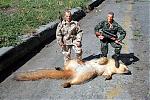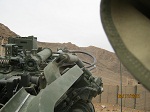Empire:
Owing partly to historical circumstances, and partly to the sense of the etymological connexion between the two words, empire has always had the specific sense ‘rule or territory of an Emperor’ [
which see Finley’s comments above-T] as well as the wider meaning which it derives from its etymology.
I.
Imperial Rule or dignity.
1. Supreme and extensive political dominion;
esp. that exercised by an ‘emperor’ (in the earlier senses), or by a sovereign state over its dependencies.
2.
transf. and
fig. Paramount influence, absolute sway, supreme command or control [
NATO anyone?! I would have included S. Korea but C&C reverts to them soon!- T]
3. The dignity or position of an emperor also the reign of an emperor.
4. A government in which the sovereign has the title of emperor.
II
That which is subject to imperial rule.
5. An extensive territory (
esp. an aggregate of many separate states) under the sway of an emperor or supreme ruler; also, an aggregate of subject territories ruled over by a sovereign state.
6.
transf. and
fig. (cf. realm).
7. A country of which the sovereign owes no allegiance to any foreign superior.
III. 8.
attrib. and
Comp., as empire-plan, -race, etc.; (in matters of dress, of the first Napoleonic empire) Empire City, State; in U.S. a name for the City and State of New York.
(p.854)










 That said I agree with
That said I agree with  ).
). );
);

Bookmarks